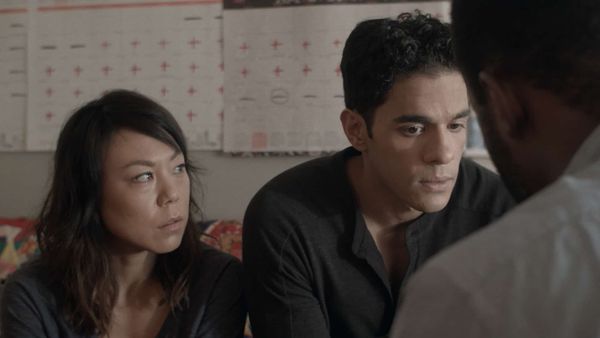Eye For Film >> Movies >> Anya (2019) Film Review
Anya
Reviewed by: Jennie Kermode

Infertility is more common than you might think. It affects roughly one in ten couples in the US (one in seven in the UK), and although an increasing number of them can overcome it with the aid of technology, for others this proves impossible. Libby (Ali Ahn) has been through three miscarriages with her husband Marco (Gil Perez-Abraham) when this story begins, but what they discover after turning to a biologist friend Seymour (Motell Gyn Foster) for help turns their whole world upside down. individually - with the right partner - each of them is perfectly capable of producing health children. it's just that they're different species.
It's thought to be at least 12,000 years since the Red Deer Cave People of Guangxi, the last human species clearly distinct from our own, went extinct, but the proposition that there could still be others living under the radar is not entirely unreasonable. The usual definition of a species is simply that its members can't interbreed with others to produce fertile offspring, but it's fuzzy - every now and then a mule gives birth, and that's before we even get to the chaotic phenomenon that is horizontal gene transfer. There's no reason why to modern human species couldn't look and behave much the same way. Marco is from a small immigrant community living - like many others - in New York City. He hasn't been in contact with them since meeting Libby because leaving the community is forbidden - again, not all that unusual. The reason given for it in this particular case, however, is interesting - community members believe themselves to be cursed because if they mix with outsiders, they can never have children.

It's an intriguing concept and a reminder that there's much more to science fiction than robots and spaceships. Seymour is naturally excited by the discovery but even as he seeks to make contact with other members of the community to confirm his findings, he's wrestling with his conscience. What would it do to these people to suddenly be the focus of so much attention? Would they be in danger? And if he were to edit their genes so that they had the option of having children with others, essentially removing the genes that made them unique... well, there's a name for that.
By focusing on the young couple whose ostensibly simple problem has plunged them into this complex situation, writer/director team Jacob Akira Okada and Carylanna Taylor maintain an intimate and relatable story whilst taking on big biological and sociological issues. The film isn't always convincing - some of Seymour's concerns arise remarkably late in the day and there are issues wit his methodology that will raise a few eyebrows among academics, but the core ideas are solid and the notion of how a community like this might conduct itself is well thought out. There are obvious parallels with real world issues around ethnicity and cultural segregation. The absence of white characters reduces the risk of uncomfortable dialogues around presumed genetic hierarchy (at least for mainstream Western audiences) but that shadow is always present, even as the film seeks to explore minority ethnic experiences from the perspective of insiders.
Having developed all these good ideas, Okada and Taylor don't really seem to know where to go with them. The ending is presented as a neat solution when it's every bit as problematic as the alternatives. There's some good work along the way, however. Libby is a refreshingly competent central character who can adapt to take on lots of different challenges and Perez-Abraham imbues Marco with a sweetness that makes sense of the couple's relationship as well as befitting someone who has grown up sheltered from many aspects of city life. The community we eventually meet feels solid and real.
Despite the much-hyped Human Genome Project, human diversity remains quite poorly mapped. Anya is a smart little film which will leave you wondering what surprises might still be in store for us in the real world - and whether or not we're grown-up enough to deal with them.
Reviewed on: 19 Nov 2019















